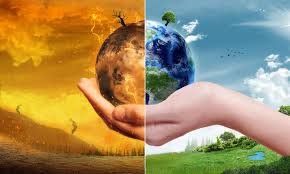Unveiling the Truth: The Science Behind Climate Change Demystified
Introduction to climate change
Climate change is a pressing issue that has captured the attention of scientists, policymakers, and the general public alike. It refers to long-term shifts in temperature, precipitation patterns, and other climatic variables that result from both natural processes and human activities. In this article, I will delve into the science behind climate change, exploring the causes, impacts, and possible solutions to this global phenomenon.
The greenhouse effect and its role in climate change
To understand climate change, it is crucial to grasp the concept of the greenhouse effect. The Earth's atmosphere acts like a blanket, trapping heat from the sun and keeping our planet warm. This natural process is necessary for life to exist on Earth. However, human activities, such as burning fossil fuels and deforestation, have significantly increased the concentration of greenhouse gases in the atmosphere. These gases, including carbon dioxide (CO2) and methane (CH4), trap more heat than necessary, leading to a rise in global temperatures.
Historical evidence of climate change
Climate change is not a new phenomenon. Throughout Earth's history, there have been periods of warming and cooling, often associated with natural factors such as volcanic eruptions and variations in solar radiation. However, the current rate of climate change is unprecedented and largely driven by human activities. Scientists have reconstructed past climate conditions using various proxies, such as ice cores, tree rings, and sediment layers. These records provide compelling evidence that the Earth's climate is rapidly changing, with the most recent warming trend occurring in the past century.
The human impact on climate change
Human activities have had a profound impact on the Earth's climate system. The burning of fossil fuels, such as coal, oil, and natural gas, releases large amounts of CO2 into the atmosphere. Deforestation, on the other hand, reduces the planet's capacity to absorb CO2 through photosynthesis. The combined effect of these activities has led to a significant increase in greenhouse gas concentrations, resulting in a warmer climate. Moreover, industrial processes and agricultural practices also contribute to the emission of other potent greenhouse gases, such as CH4 and nitrous oxide (N2O).
Common myths and misconceptions about climate change
Despite the overwhelming scientific consensus on climate change, there are still common myths and misconceptions that persist in public discourse. One prevalent myth is that climate change is purely a natural phenomenon and not influenced by human activities. However, extensive research and data analysis have unequivocally shown that human actions are the primary driver of the current warming trend. Another misconception is that climate change is a distant problem that will only affect future generations. In reality, the impacts of climate change are already being felt worldwide, from rising sea levels to more frequent and intense extreme weather events.
The scientific consensus on climate change
The scientific community is overwhelmingly in agreement that climate change is real and largely caused by human activities. Numerous scientific organizations, including the Intergovernmental Panel on Climate Change (IPCC), have assessed the evidence and concluded that the Earth's climate is warming at an unprecedented rate. These assessments are based on decades of research, data collection, and computer models that simulate past and future climate scenarios. While there may be ongoing scientific debates and uncertainties about specific aspects of climate change, the consensus among experts is clear: urgent action is needed to mitigate its impacts.
Impacts of climate change on the environment and society
Climate change has far-reaching consequences for both the environment and human society. Rising temperatures and changing precipitation patterns can lead to more frequent and severe droughts, floods, and storms, impacting agriculture, water resources, and infrastructure. Biodiversity is also at risk, as species struggle to adapt to rapidly changing conditions. Additionally, climate change exacerbates existing social and economic inequalities, disproportionately affecting vulnerable populations who lack the resources to adapt or recover from its impacts. It is essential to recognize that climate change is not just an environmental issue but a complex challenge that requires interdisciplinary solutions.
Mitigation and adaptation strategies for climate change
Addressing climate change requires a two-pronged approach: mitigation and adaptation. Mitigation focuses on reducing greenhouse gas emissions to limit the extent and pace of climate change. This involves transitioning to cleaner energy sources, improving energy efficiency, and implementing policies that promote sustainable practices. Adaptation, on the other hand, involves preparing for and adapting to the unavoidable impacts of climate change. This includes building climate-resilient infrastructure, implementing early warning systems, and enhancing community preparedness. Both mitigation and adaptation strategies are essential in creating a more sustainable and resilient future.
The role of renewable energy in combating climate change
Renewable energy plays a crucial role in combating climate change by reducing greenhouse gas emissions and promoting sustainable development. Unlike fossil fuels, renewable energy sources such as solar, wind, and hydropower do not release CO2 during operation. The global shift towards renewable energy is gaining momentum, driven by technological advancements, falling costs, and increasing awareness of the environmental and health benefits. However, further investments and policy support are needed to accelerate the transition to a low-carbon economy and achieve the necessary reductions in greenhouse gas emissions.
Conclusion: Taking action against climate change
In conclusion, understanding the science behind climate change is critical for addressing this global challenge. The evidence is clear: climate change is real, largely caused by human activities, and already having significant impacts on the environment and society. It is incumbent upon us to take action and implement sustainable solutions to mitigate its effects and adapt to the changes that are already underway. By embracing renewable energy, adopting more sustainable practices, and advocating for stronger climate policies, we can work towards a future that is resilient, equitable, and in harmony with our planet.
CTA: Join the global movement for climate action. Take small steps in your everyday life to reduce your carbon footprint, support renewable energy initiatives, and engage in conversations about climate change. Together, we can make a difference and ensure a sustainable future for generations to come.

